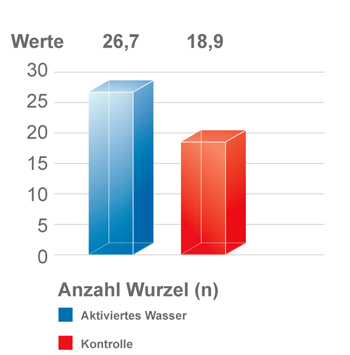SET for Plants: Root Formation
Scientific evidence
Evidence of increased root formation in plant seedlings: Influence of SET on adventitious root formation of mung bean (vigna radiata) and cress (lepidium sativum)
Institute for Agricultural and Urban Ecological Projects
At the Humboldt University Berlin
Invalidenstraße 42, 10115 Berlin
Project management: Dr. Rafael Valbuena
Scientific editing:
Dipl.-Ing. Karen Sensel
Dr. Amarilis Suarez
Zusammenfassung
Activated water produced with the SET5 device (activated air) tended to have a positive effect on adventitious root formation in mung beans and cress. This positive effect could be statistically significantly demonstrated in trial 2.
Introduction: Task
Several effects have been reported with the application of activated water. The aim of the experiments carried out was to test whether air activated with SET, bubbled through water, can influence adventitious root formation and germination of mung beans (vigna radiata) and cress (lepudium sativum) using biotest methods.
Experiments carried out:
Materials
Plants
The mung bean and cress were selected for the study of adventitious root formation. The mung bean (Vigna radiata), also called mung bean, Jerusalem bean or lunja bean, is a useful plant from the legume family. Cress (Lepudium sativum) is an annual herbaceous plant and reaches heights of up to 50 centimetres.
Substrate
Vermiculite was selected as substrate for the experiments with mung beans.
Aqueous test solution
Demineralised water: The water was demineralised with an ion exchanger. Distilled water: The water was demineralised and then distilled. Activated water: depending on the control variant (demineralised or distilled water), the demineralised or distilled water was activated with the Active Air 5 device from Medical Biophysics GmbH shortly before its application. For this purpose, the activated air from the Active Air 5 device was injected into 500 ml of the respective water for 30 min and thus activated. Until use, the activated water was stored in a special violet glass bottle.
Trials:
Trial 1: Influence of activated water on mung bean germination
Trial 2: Influence of activated water on adventitious root formation of mung beans
Results:
Trial 1: All mung bean seeds had germinated slightly after 24 hours of standing in the dark. No difference in germination rate could be observed between the variant treated with activated water or distilled water, as all 100 seeds per variant had germinated.
Trial 2: The table shows the results of test series 2. There are significant differences with regard to the respective parameter. The activated water positively influenced the number of roots of the mung beans. For this parameter, a significant difference was found between the activated water variant (watering and induction with activated water) and the control variant.

